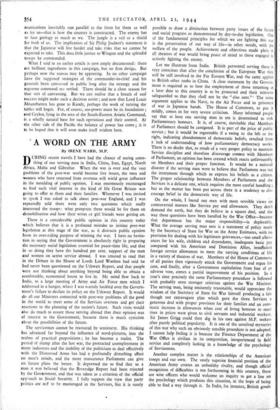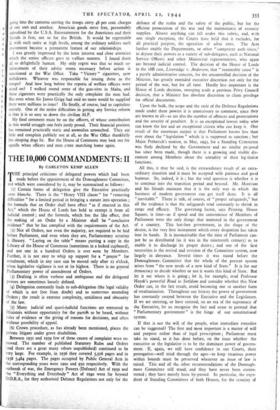A WORD ON THE ARMY
By IRENE 1VARD, M.P.
There is a considerable public opinion in this country today which believes that it is a profound mistake to initiate post-war legislation at this stage of the war, as it distracts public opinion from its over-riding purpose of winning the war. I have no hesita- tion in saying that the Government is absolutely right in preparing the necessary social legislation essential for peace-time life, and that in so doing they have the hundred per cent. support of the men and women on active service abroad. I was amused to read that in the Debate in the House of Lords Lord Woolton had said he had never been questioned on the Uthwatt Report, and that people were not thinking about anything beyond being able to obtain a comfortable, economical house to live in. My mind flew back to India, to a large meeting of Army and Air Force men which I addressed in a hangar, where I was warmly heckled over the Govern- ment's failure to declare its policy on the Uthwatt Report. It would do all our Ministers connected with post-war problems all the good in the world to meet some of the Services overseas and get their reactions to the planning of the nation's future. Such visits would also do much to assure those serving abroad that their opinion was of interest to the Government, because there is much cynicism about the possibilities of the future.
The serviceman cannot be reassured by sentiment. His thinking has advanced far beyond the influence of word-pictures, into the realms of practical propositions ; he has become a realist. The period-of slump after the last war, the protracted unemployment in many industries and the inability of the politicians to deal effectively with the Distressed Areas has had a profoundly disturbing effect on men's minds, and the more reassurance Parliament can give on future ptans the better. It depressed me to find that to a man it was believed that the Beveridge Report had been rejected by the Government, and that was taken as a criterion of the official app-oach to Social Security. I fully support the view that party politics are not to be encouraged in the Services, bin it is surely possible to draw a distinction between party issues of the future and social progress as demonstrated by day-to-day legislation. One of the fundamental principles for which we are fighting this war is the preservation of our way of life—in other words, with the welfare of the people. Achievement and objectives made plain in all theatres of war would bring peace of mind to those engaged in actively fighting the enemy.
Let me illustrate from India. British personnel serving there is very conscious that after the conclusion of the European War they will be still involved in the Far Eastern War, and the same applies to British other ranks in China. -A clear statement by the Govern- ment is required as to how the employment of those returning at a later date to this country is to be protected and their interests safeguarded so that they shall not be the "also rms."- The same argument applies to the Navy, to the Air Force and to prisoners of war in Japanese hands. The House of Commons, to put it mildly, comes in for very severe criticism. Many informed people say that at least one serving man in ten is determined to seek Parliamentary honours. It is, of course, inevitable that Members of Parliament should be castigated. It is part of the price of public service ; but it would be regrettable if a swing to the left or the right, indicating abandonment of democratic beliefs, resulted from a lack of understanding of how parliamentary democracy works. There is no doubt that, as result of a very proper policy to maintain Service discipline and therefore discourage concoct with Members of Parliament, an opinion has been created which reacts unfavourably on Members and their proper function. It would be a national disaster if the serving man were to believe that Parliament was not the instrument through which to express his beliefs as a citizen. The proper relationship between Members of Parliament and the Services is a delicate one, which requires the most careful handling ; but as the matter has been put across there is a tendency to dis- courage belief in the democratic way of life.
On the whole, I found our men with most sensible views on controversial matters like Service pay and allowances. They don't demand the earth, but they do believe in a square deal, and the way these questions have been handled by the War Office—because that department has the major responsibility—is deplorable. What the average serving man sees is a statement of policy made by the Secretary of State for War on the Army Estimates, with no provision for dealing with his legitimate grievances,—too small allow- ances for his wife, children and dependants, inadequate basic pay compared with his American and Dominion Allies, insufficient foreign service allowances to meet the varying conditions of life in a variety of theatres of war. Members of did' House of Commons of all parties then vigorously attack the Government and argue his case, and finally, after a Government capitulation from fear of an adverse vote, comes a partial improvement of his position. In a year's time precisely the same Parliamentary procedure is followed with probably even stronger criticism against the War Minister. The serving man, being eminently reasonable, would appreciate the wisdom of the Secretary of State for War himself producing a fair though not extravagant plan which gave the three Services a generous deal with proper provision for their families and an auto- matic increase in allowances when cost of living bonuses to meet rises in prices were given to civil servants and industrial workers. Sir James Grigg could then dig in his toes against M.P. seekers after purely political popularity. It is one of the unsolved mysteries of this war why such an obviously sensible procedure is not adopted. I cannot help feeling it is because the Finance Department of the War Office is civilian in its composition, inexperienced in field service and completely lacking in a knowledge of the psychology of Servicemen.
Another complex matter is the relationships of the American troops and our own. The vastly superior financial position of the American Army creates an unhealthy rivalry, and though official recognition of difficulties is not forthcoming in this country, there are wise officers who would welcome an inquiry to get a line on the psychology which produces this situation, in the hope of being able to find a way through it. In India, for instance, British goods going into the canteens serving the troops carry 48 per cent. charges of one sort. and another. American goods enter free, presumably subsidised by the U.S A. Entertainment for the Americans and their friends is free, not so for the British. It would be regrettable if, with such unity at high levels, among the ordinary soldiers such resentment became a permanent feature of our relationships.
I was greatly impressed by the keen interest and close attention which the senior officers gave to welfare matters. I found them all so delightfu:ly human. My only regret was that so much re- inforcement of their advice seems necessary before action is sanctioned at the War Office. Take " Victory " cigarettes, now withdrawn. Whoever was responsible for issuing these to the troops? And how long before the reports of welfare officers were acted on? I walked round some of the gun-sites in Malta, and these cigarettes were practically the only complaint the men had. But even when Sir James Grigg had said no more would be supplied there were millions to issue! He finally, of course, had to capitulate entirely. One of the major difficulties in getting any Service reform is that it is so easy to down the civilian M.P.
My final comment must be on the officers, of whose contribution in this world struggle one feels justly proud. Their financial position has remained practically static and anomalies untouched. They say little and complain publicly not at all, so the War Office thankfully lets sleeping dogs lie. But the House of Commons may look out for squalls when officers and men come marching home again.



























 Previous page
Previous page